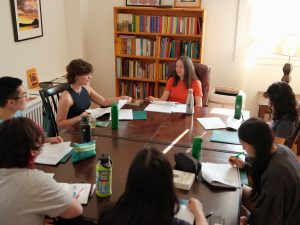The Seminar
Learn to ask the questions that matter to you
In Seminar you read, reflect on, and discuss great books from the world’s various philosophical, spiritual, and literary traditions.
The Seminar serves as a gateway to the college academic experience. Guided by experienced DRBU faculty, you will cultivate close reading, critical thinking, and effective communication skills in a supportive classroom environment. You will learn to ask the questions that are important to you, and to explore the questions that are important to others.
Past Seminars
Contemporary commentators claim we are living in a “post-truth” era—but what is the meaning of this claim? When we say we seek the truth, what are we seeking? The histories of human thought and culture are far from univocal in their formulations of truth. Is it timeless or determined by place and time? Does it come from within or without—or does it transcend such distinctions? Is something valuable or important just because it is true? In this course, we will examine various notions of truth and its source as well as our relationship to what we trust, in the hopes of coming to a better understanding of what we mean by truth.
Selected Readings:
-
- Phaedrus by Plato
- In a Grove by Ryunosuke Akutagawa
- The Mark on the Wall by Virginia Woolf
- The Kalama Sutra
- Dissoi Logoi
The Matrix, the Metaverse, and other modern forays into virtual environments have all brought to our cultural consciousness a question that lies at the heart of human experience: what is the nature of reality? Is it what we perceive through our senses? Or what we are able to conceive? Is it totally beyond our knowledge? The French thinker René Descartes wrestled with the possibility of radical skepticism; Indian yogis strove to free themselves from a veil of illusions; and the Chinese philosopher Zhuangzi, having dreamt that he was a butterfly, wondered whether he was not really a butterfly dreaming it was Zhuangzi. In this course, we will examine perspectives on reality from various time periods and cultures—and if we lose ourselves a little in the process, maybe we’ll be surprised at what we gain.
Selected Readings:
-
- The Dao De Jing by Lao Zi
- The Yoga Sutras by Patanjali
- The Trial by Franz Kafka
- On Truth and Lies in a Nonmoral Sense by Friedrich Nietzsche
- The Bhagavadgita

